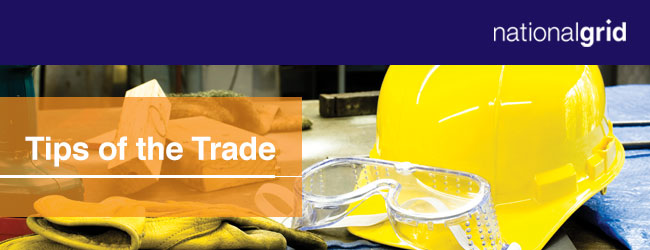
Don't rely on your nose alone!
Welcome to National Grid’s Tips of the Trade. National Grid is committed to your safety and these tips are intended to help you work safely near our facilities. Please review these tips with your coworkers at your tailgate or tool box meetings before work begins.
Natural gas leaks don’t always have an odorNational Grid adds an odorant, mercaptan, to natural gas that gives it its distinctive smell; many describe it as similar to sulfur or rotten eggs, but it may smell differently to you. Sometimes this odor is not apparent, so you must use your senses of sight and hearing (not just your nose) to detect a gas leak. Look for
Listen for
Dig safelyCall 811 or enter an online request well in advance of any digging job, no matter how small. The 811 service will notify underground facility owners in the immediate area so the location of utility lines can be marked prior to excavation.
If you suspect a gas leak…Warn others and evacuate the area. Do not use matches, cell phones, radios, lighters or anything else that could create a spark and ignite the gas. Leave the excavation open; do not operate pipeline valves or bury the line. From a safe location, call 911, call National Grid and report the leak to your supervisor. Stay away from the area until safety officials say it is safe to return. Would you like to know more?Additional overhead and digging guidelines, case studies, instructional videos and training tools can all be found, at no charge to you, on National Grid’s e-SMARTworkers website. Do you like this email series? Do you find the information helpful? We’d like to know. Please reply to this email and tell us what you think, or let us know what topics you’d like to see in future emails. For more contractor safety information, visit ngridsafety.com.
|
|||||||||
 |
Smell Gas. Act Fast. |
||||||||
Call 811 or enter an online request at least 72 hours before digging in Massachusetts and Rhode Island, and at least 48 hours in New York, excluding weekends and legal holidays:
| |||||||||
|
|||||||||
| #10706 |